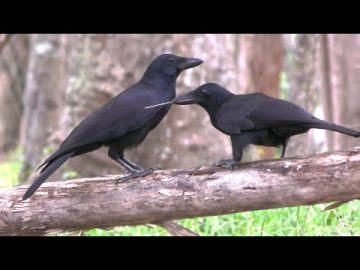Amanda Heidt in Science:
 Human beings typically don’t leave the nest until well into our teenage years—a relatively rare strategy among animals. But corvids—a group of birds that includes jays, ravens, and crows—also spend a lot of time under their parents’ wings. Now, in a parallel to humans, researchers have found that ongoing tutelage by patient parents may explain how corvids have managed to achieve their smarts. Corvids are large, big-brained birds that often live in intimate social groups of related and unrelated individuals. They are known to be intelligent—capable of using tools, recognizing human faces, and even understanding physics—and some researchers believe crows may rival apes for smarts. Meanwhile, humans continue to grow their big brains and build up their cognitive abilities during childhood, as their parents feed and protect them. “Humans are characterized by this extended childhood that affects our intelligence, but we can’t be the only ones,” says Natalie Uomini, a cognitive scientist at the Max Planck Institute for the Science of Human History. But few researchers have studied the impact of parenting throughout the juvenile years on intelligence in nonhumans.
Human beings typically don’t leave the nest until well into our teenage years—a relatively rare strategy among animals. But corvids—a group of birds that includes jays, ravens, and crows—also spend a lot of time under their parents’ wings. Now, in a parallel to humans, researchers have found that ongoing tutelage by patient parents may explain how corvids have managed to achieve their smarts. Corvids are large, big-brained birds that often live in intimate social groups of related and unrelated individuals. They are known to be intelligent—capable of using tools, recognizing human faces, and even understanding physics—and some researchers believe crows may rival apes for smarts. Meanwhile, humans continue to grow their big brains and build up their cognitive abilities during childhood, as their parents feed and protect them. “Humans are characterized by this extended childhood that affects our intelligence, but we can’t be the only ones,” says Natalie Uomini, a cognitive scientist at the Max Planck Institute for the Science of Human History. But few researchers have studied the impact of parenting throughout the juvenile years on intelligence in nonhumans.
…The experiments strongly suggest parenting helps shape bigger brains, says study co-author Michael Griesser, an evolutionary biologist at the University of Konstanz. It’s costly to grow a large brain—our own requires 20% of our daily calories—and juveniles start their learning early. “The only way you can do that is through parental investment”—providing an example and feeding juveniles as their brains grow, he says.
More here.
